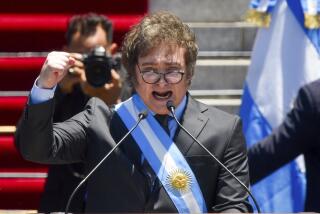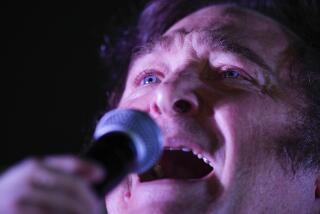Argentina Keeps Mysteriously Failing
- Share via
BUENOS AIRES, Argentina — Twenty years ago, near the end of a “dirty war” and just before a disastrous invasion of the Falkland Islands, V.S. Naipaul wrote that given all its human and physical resources, Argentina’s failure as a nation is “one of the mysteries of our time.”
But it is no mystery. The problem with Argentina is Argentines, however brilliant and beautiful they may be.
The country’s greatest writer, Jorge Luis Borges, said so decades ago. Today, most Argentines will tell you so immediately. Ask the prominent sociologist and talk-show host Mario Grondona, author of a recent book on “progress prone” and “progress resistant” cultures (guess which Argentina is). Ask Argentina’s greatest living comic, Enrique Pinti, who says simply, “There is something in the collective conduct that doesn’t work.” Ask any Buenos Aires taxi driver, one of whom said to me, “Here, we spend all our energies fighting each other.”
Consider the historical record. A century ago Argentina was one of the fastest developing countries in the world. Then, for almost a century, military and civilian governments led the country step by step back from the first into the third world. In the early 1990s, a sea change occurred when Economy Minister Domingo Cavallo, under President Carlos Menem, launched a series of major market reforms that seemed to be making chaos, stagnation and decline a thing of the past.
But Cavallo resigned in the mid-1990s, and now Argentines, with the help of adverse economic developments in Mexico, Southeast Asia, Russia and Brazil, have restored traditional pessimism about their future both at home and abroad.
With the economic progress and optimism of the Cavallo years long gone, President Fernando de la Rua is once again turning to Cavallo to take over the economy and set it right, praying that Cavallo’s reemergence will restore that lost hope.
During the electoral campaign in 1999, De la Rua promised to eliminate corruption and restore economic growth. In an early address the new president said his goals were to end corruption and to “grow, grow, grow.”
He has done neither. Indeed, under his leadership, with inconsistent and sometimes contradictory policies, conditions became so bad that late last year Argentina had to go to the International Monetary Fund for a $40-million loan to service its $124-billion foreign debt.
Argentina is faced with many problems, from a general lack of confidence in its president and the nation’s justice system to corruption, excessive gas and electricity prices and an increasing rejection of the market model itself.
The appointment of Cavallo will have strong international support, but even an economist of his reputation will have trouble with the president’s unstable coalition, the unions and many Argentines. It remains to be seen whether Cavallo can even begin to carry out his assignment.
If Argentines persist in their historical compulsion to constantly fight among themselves instead of cooperating in order to move forward, they and the hemisphere will pay a heavy price in the years ahead.
More to Read
Sign up for Essential California
The most important California stories and recommendations in your inbox every morning.
You may occasionally receive promotional content from the Los Angeles Times.













